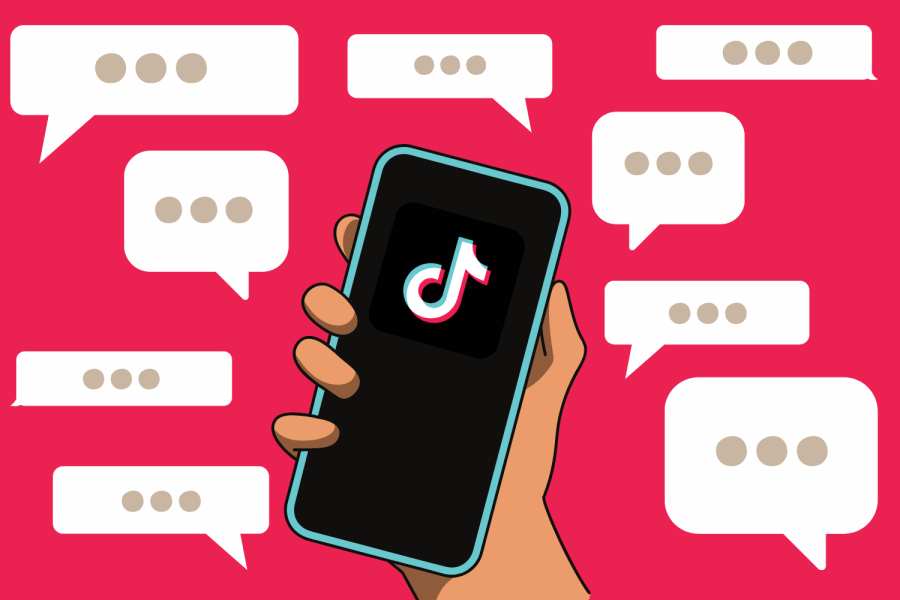Why Gen Z’s humor is different from other generations
TikTok has contributed greatly to Gen Z’s humor in recent years with its popularity among young people, and it continues to make it more difficult for older people to relate to the younger generation.
December 1, 2022
Older generations have difficulty understanding the humor of today’s teenagers and young adults, known as Generation Z (Gen Z). Though this kind of divide between age groups has always been present, particular circumstances have created a gap between Gen Z humor and other generations that cannot be observed in history.
Contrasting themselves from their parents in whatever way possible is typical of teenagers. Despite this typicality, Gen Z has developed a distinct style of humor that makes relating to older generations even more difficult. The most obvious reason for this is that Gen Z grew up entirely in the age of the internet. There has not been a time when Gen Zers did not have access to the internet. Though this may seem like a convenience to older generations, who only see having access to the internet as access to an infinite amount of information, it presents new issues that prior generations have never faced.
According to the Pew Research Center, anyone born between the years of 1997 and 2012 is part of Gen Z. From its birth in the 80s, the internet has become a primary source of entertainment for so many people today, specifically through social media sites. With Gen Z being so young at the time that the internet was popular, constant stimulation has always been accessible. This access has contributed to an entirely new aspect of this generation’s culture that stems from trending topics or videos on the internet. Trending videos on platforms like YouTube have made it so that Gen Zers can always see what other Gen Zers find funny. Thus, forming the new ability to create a distinct type of humor that is too specific for other generations to understand if they didn’t view the same type of content.
One genre of humor that has always been present is “Dark Humor.” In the past, it mainly took the form of self-deprecating jokes, which are still present in Gen Z’s “Dark Humor,” although they are to a higher degree. Another form of this humor has become more present, stemming from constant exposure to frightening events. The 21st century has unfortunately not fallen short when it comes to traumatic events, and humor has become the easiest coping mechanism for young people. From a pandemic to terrifying mass shootings, to increased violent crimes overall. There has rarely been a time in recent years when news stations and social media outlets weren’t constantly broadcasting the horrors of these events. It has been easiest for young people to make lightheartedness of the situation through jokes, even if not done most sensitively. “Dark Humor” may seem like an acceptable form of coping with anxiety and fear for Gen Z, but others can easily perceive these jokes as inappropriate and insensitive.
The most recent development that has shaped teenagers’ humor is the social media platform known as TikTok. TikTok is one of the most popular social media platforms that has sprouted in the last couple of years and is dominated by teenagers and young adults, as shown by recent data. The appeal of this app comes from the instant entertainment that videos as short as 15 seconds provide. The algorithm of TikTok is so advanced that by only spending a short period scrolling through posted videos, the site will already have curated content to the user’s liking. This quality of TikTok makes it so addictive that it is a primary form of entertainment for much of Gen Z. With this exposure, TikTok has become the main force in shaping Gen Z’s humor. The minuscule time slot allotted for TikTok videos makes it essential that creators provide amusement straightforwardly to gain viewers’ attention. This aspect has caused the formation of a genre of videos that may leave older adults confused. Often, these short but hilarious clips posted on the app are so insignificant in their underlying meaning that that is the actual joke. For example, on my “For You Page” I came across a video with 2.1 million likes; it was a clip of kids trick-or-treating and one of them was in an inflatable Sully costume and was punching the air while “Where is My Mind?” by the Pixies was playing in the background. It sounds absurd when explained, but that absurdity is the reason why it had so many likes. It didn’t have any hidden meaning, it didn’t have any caption or explanation with it, and it was so meaningless and chaotic that it was amusing. This genre of Gen Z humor could only have formed on a platform like TikTok, where amusement is easily lost if videos are not curated correctly.
After pointing out how ridiculous the jokes often are, it is understandable why so many adults today have difficulties relating to and understanding Gen Z’s humor. Gen Zers may take pride in their distinct form of amusement now, but how will they react when new genres of entertainment are created by the next generation of teenagers?








